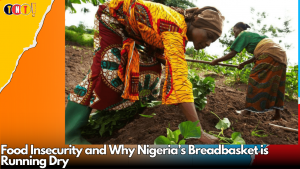
Nigeria, often referred to as the “breadbasket” of West Africa due to its vast agricultural potential, is facing a severe food insecurity crisis. Despite its fertile lands and agricultural resources, the country struggles with a paradox: while it has the capacity to produce abundant food, millions of Nigerians are suffering from hunger and malnutrition. The causes of this crisis are complex and multifaceted, reflecting a mix of economic, environmental, and social factors.
The Crisis Unfolds
Food insecurity in Nigeria has been exacerbated by a combination of rising food prices, declining agricultural output, and widespread poverty. The World Food Programme and other international agencies have highlighted that a significant portion of Nigeria’s population is unable to access sufficient and nutritious food. This crisis affects not only the urban poor but also rural communities that are heavily reliant on agriculture.
Factors Contributing to the Crisis
Climate Change and Environmental Degradation
- Erratic Weather Patterns: Nigeria’s agricultural sector is increasingly vulnerable to the effects of climate change. Irregular rainfall, prolonged droughts, and flooding have disrupted planting and harvesting cycles, leading to lower crop yields.
- Soil Degradation: Intensive farming practices and deforestation have degraded soil quality, reducing its fertility and capacity to support crops.
Insecurity and Conflict:
- Insurgency and Banditry: Ongoing conflicts, especially in the northeastern regions, have displaced millions of people and disrupted agricultural activities. Farmers are often forced to abandon their lands due to violence and insecurity.
- Farmers-Herders Clashes: Tensions between farmers and pastoralists over land and water resources have resulted in frequent clashes, further impacting agricultural productivity and food security.
Economic Challenges:
- Inflation and Food Prices: Rising inflation has driven up the cost of food, making it less affordable for many Nigerians. The removal of fuel subsidies and subsequent increase in transportation costs have further exacerbated the issue.
- Currency Depreciation: The depreciation of the naira has increased the cost of imported agricultural inputs such as fertilizers and seeds, impacting local food production.
Inadequate Infrastructure:
- Poor Transportation Networks: Inefficient transportation and logistics infrastructure have led to high post-harvest losses. Farmers often struggle to get their produce to market, resulting in wasted food and lost income.
- Limited Storage Facilities: Lack of adequate storage facilities leads to spoilage and wastage, especially during harvest seasons when supply exceeds demand.
Government Policies and Support:
- Insufficient Support for Farmers: Government policies and support programs for agriculture are often inadequate or poorly implemented. Subsidies and incentives intended to boost agricultural production frequently fail to reach those who need them most.
- Corruption and Mismanagement: Corruption and mismanagement within agricultural ministries and agencies have undermined efforts to improve food security and support farmers.
Population Growth:
- Rising Demand: Nigeria’s rapidly growing population places increased pressure on food production systems. As demand outstrips supply, food prices rise, and access to affordable food becomes more difficult for many.
Addressing the Crisis
To tackle food insecurity effectively, Nigeria must adopt a comprehensive and multi-pronged approach:
- Strengthening Agricultural Systems: Investments in modern farming techniques, climate-resilient crops, and sustainable practices can enhance agricultural productivity and resilience.
- Improving Infrastructure: Developing better transportation, storage, and market facilities will reduce post-harvest losses and improve the efficiency of food supply chains.
- Enhancing Security: Addressing conflicts and ensuring the safety of farming communities is crucial for enabling consistent agricultural activities and protecting food production.
- Government and Policy Reforms: Implementing effective and transparent policies, increasing support for farmers, and ensuring that agricultural programs are well-targeted and efficiently managed are essential for improving food security.
- Fostering Innovation: Encouraging innovation and technological advancements in agriculture can help increase yields, reduce losses, and create more sustainable food systems.
Nigeria’s food insecurity crisis highlights a pressing need for strategic interventions and comprehensive reforms. While the country’s agricultural potential remains vast, addressing the myriad factors contributing to food insecurity is crucial for ensuring that Nigeria’s breadbasket can truly meet the needs of its people. By tackling these challenges head-on, Nigeria can work towards a future where food security is not just a promise, but a reality for all its citizens.



